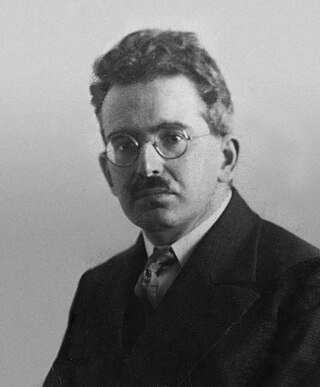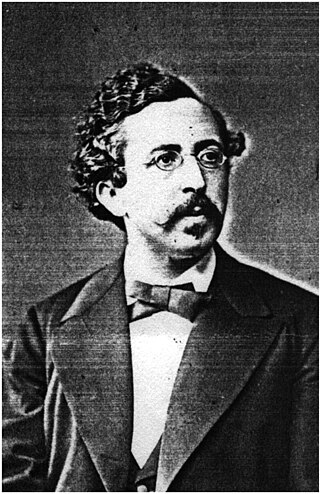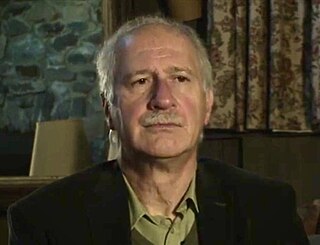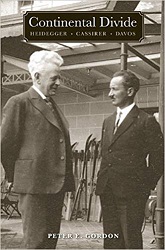
Martin Heidegger was a German philosopher who is best known for contributions to phenomenology, hermeneutics, and existentialism. He is often considered to be among the most important and influential philosophers of the 20th century.

Richard McKay Rorty was an American philosopher. Educated at the University of Chicago and Yale University, he had strong interests and training in both the history of philosophy and in contemporary analytic philosophy. Rorty's academic career included appointments as the Stuart Professor of Philosophy at Princeton University, Kenan Professor of Humanities at the University of Virginia, and Professor of Comparative literature at Stanford University. Among his most influential books are Philosophy and the Mirror of Nature (1979), Consequences of Pragmatism (1982), and Contingency, Irony, and Solidarity (1989).

Walter Bendix Schönflies Benjamin was a German Jewish philosopher, cultural critic, media theorist, and essayist. An eclectic thinker who combined elements of German idealism, Romanticism, Western Marxism, Jewish mysticism, and Neo-Kantianism, Benjamin made influential contributions to aesthetic theory, literary criticism, and historical materialism. He was associated with the Frankfurt School and also maintained formative friendships with thinkers such as playwright Bertolt Brecht and Kabbalah scholar Gershom Scholem. He was related to German political theorist and philosopher Hannah Arendt through her first marriage to Benjamin's cousin Günther Anders, though the friendship between Arendt and Benjamin outlasted her marriage to Anders. Both Arendt and Anders were students of Martin Heidegger, whom Benjamin considered a nemesis.
Continental philosophy is a term used to describe some philosophers and philosophical traditions that do not fall under the umbrella of analytic philosophy. However, there is no academic consensus on the definition of continental philosophy. Prior to the twentieth century, the term "continental" was used broadly to refer to philosophy from continental Europe. A different use of the term originated among English-speaking philosophers in the second half of the 20th century, who used it to refer to a range of thinkers and traditions outside the analytic movement. Continental philosophy includes German idealism, phenomenology, existentialism, hermeneutics, structuralism, post-structuralism, deconstruction, French feminism, psychoanalytic theory, and the critical theory of the Frankfurt School as well as branches of Freudian, Hegelian and Western Marxist views. There is widespread influence and debate between the analytic and continental traditions; some philosophers see the differences between the two traditions as being based on institutions, relationships, and ideology rather than anything of significant philosophical substance.

Hermann Cohen was a German Jewish philosopher, one of the founders of the Marburg school of neo-Kantianism, and he is often held to be "probably the most important Jewish philosopher of the nineteenth century".

Ernst Alfred Cassirer was a German philosopher. Trained within the Neo-Kantian Marburg School, he initially followed his mentor Hermann Cohen in attempting to supply an idealistic philosophy of science.

Being and Time is the 1927 magnum opus of German philosopher Martin Heidegger and a key document of existentialism. Being and Time is among the most influential texts of 20th century philosophy. It had a notable impact on subsequent philosophy, literary theory and many other fields. Though controversial, its stature in intellectual history has been compared with works by Kant and Hegel. The book attempts to revive ontology through an analysis of Dasein, or "being-in-the-world." It is also noted for an array of neologisms and complex language, as well as an extended treatment of "authenticity" as a means to grasp and confront the unique and finite possibilities of the individual.

Philosopher Martin Heidegger joined the Nazi Party (NSDAP) on May 1, 1933, ten days after being elected Rector of the University of Freiburg. A year later, in April 1934, he resigned the Rectorship and stopped taking part in Nazi Party meetings, but remained a member of the Nazi Party until its dismantling at the end of World War II. The denazification hearings immediately after World War II led to Heidegger's dismissal from Freiburg, banning him from teaching. In 1949, after several years of investigation, the French military finally classified Heidegger as a Mitläufer or "fellow traveller." The teaching ban was lifted in 1951, and Heidegger was granted emeritus status in 1953, but he was never allowed to resume his philosophy chairmanship.
Babette Babich is an American philosopher who writes from a continental perspective on aesthetics, philosophy of science, especially Nietzsche's, and technology, especially Heidegger's and Günther Anders, in addition to critical and cultural theory.

Martin Evan Jay is an American intellectual historian whose research interests connected history with the critical theory of the Frankfurt School, social theory, cultural criticism, and historiography.
Espen Hammer is Professor of Philosophy at Temple University. Focusing on modern European thought from Kant and Hegel to Adorno and Heidegger, Hammer’s research includes critical theory, Wittgenstein and ordinary language philosophy, phenomenology, German idealism, social and political theory, and aesthetics. He has also written widely on the philosophy of literature and taken a special interest in the question of temporality.
Michael Friedman is an American philosopher who serves as Suppes Professor of Philosophy of Science and Professor, by courtesy, of German Studies at Stanford University. Friedman is best known for his work in the philosophy of science, especially on scientific explanation and the philosophy of physics, and for his historical work on Immanuel Kant. Friedman has done historical work on figures in continental philosophy such as Martin Heidegger and Ernst Cassirer. He also serves as the co-director of the Program in History and Philosophy of Science and Technology at Stanford University.
Ethan Kleinberg works on the acrobatics of modern thought. He is Class of 1958 Distinguished Professor of History and Letters at Wesleyan University, Editor-in-Chief of History and Theory and was Director of Wesleyan University's Center for the Humanities. Kleinberg's research interests include European intellectual history with special interest in France and Germany, critical theory, educational structures, and the philosophy of history. Kleinberg's wide-ranging scholarly work spans across the fields of history, philosophy, comparative literature and religion. Together with Joan Wallach Scott and Gary Wilder he is a member of the Wild On Collective who co-authored the "Theses on Theory and History" and started the #TheoryRevolt movement. He is the author of Emmanuel Levinas's Talmudic Turn: Philosophy and Jewish Thought (SUP); Haunting History: for a deconstructive approach to the past (SUP); Generation Existential: Martin Heidegger’s Philosophy in France, 1927-61 (CUP) which was awarded the 2006 Morris D. Forkosch prize for the best book in intellectual history by the Journal of the History of Ideas and co-editor of the volume Presence: Philosophy, History, and Cultural Theory for the Twenty-First Century (CUP). He is completing a book length project titled The Surge: a new compass of history for the end-time of truth.
This is a list of articles in continental philosophy.

Paul Walter Franks is the Robert F. and Patricia Ross Weis Professor of Philosophy and Judaic Studies at Yale University. He graduated with his PhD from Harvard University in 1993. Franks' dissertation, entitled "Kant and Hegel on the Esotericism of Philosophy", was supervised by Stanley Cavell and won the Emily and Charles Carrier Prize for a Dissertation in Moral Philosophy at Harvard University. He completed his B.A and M.A, in Philosophy, Politics and Economics at Balliol College, Oxford. Prior to this, Franks received his general education at the Royal Grammar School, Newcastle, and studied classical rabbinic texts at Gateshead Talmudical College.
Andrew S. Bowie is Professor of Philosophy and German at Royal Holloway, University of London and Founding Director of the Humanities and Arts Research Centre (HARC).

The Davos University Conferences were a project between 1928 and 1931 to create an international university at Davos in Switzerland.
Joachim Ritter was a German philosopher and founder of the so-called Ritter School of liberal conservatism.

In 1929 Ernst Cassirer took part in a historically significant encounter with Martin Heidegger in Davos during the Second Davos Hochschulkurs,.

Continental Divide: Heidegger, Cassirer, Davos is a 2010 book by Peter Gordon, in which the author reconstructs the famous 1929 debate between Martin Heidegger and Ernst Cassirer at Davos, Switzerland, demonstrating its significance as a point of rupture in Continental thought that implicated all the major philosophical movements of the day. Continental Divide was awarded the Jacques Barzun Prize from the American Philosophical Society in 2010.









